中西方餐桌礼仪的文献综述
浅析中西方餐桌礼仪差异
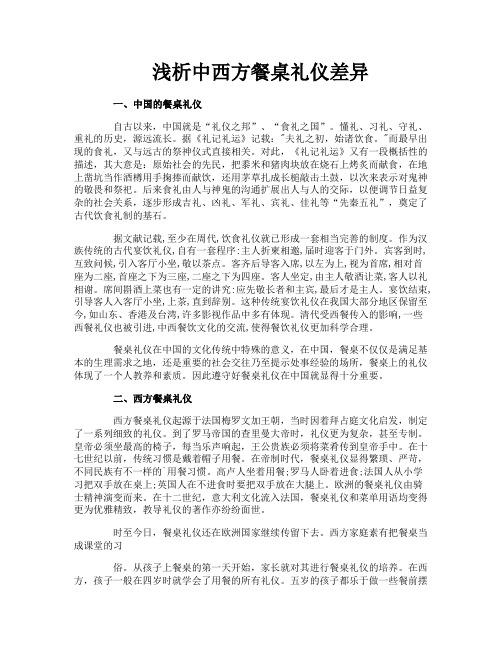
浅析中西方餐桌礼仪差异一、中国的餐桌礼仪自古以来,中国就是“礼仪之邦”、“食礼之国”。
懂礼、习礼、守礼、重礼的历史,源远流长。
据《礼记礼运》记载:"夫礼之初,始诸饮食。
"而最早出现的食礼,又与远古的祭神仪式直接相关。
对此,《礼记礼运》又有一段概括性的描述,其大意是:原始社会的先民,把黍米和猪肉块放在烧石上烤炙而献食,在地上凿坑当作酒樽用手掬捧而献饮,还用茅草扎成长槌敲击土鼓,以次来表示对鬼神的敬畏和祭祀。
后来食礼由人与神鬼的沟通扩展出人与人的交际,以便调节日益复杂的社会关系,逐步形成吉礼、凶礼、军礼、宾礼、佳礼等“先秦五礼”,奠定了古代饮食礼制的基石。
据文献记载,至少在周代,饮食礼仪就已形成一套相当完善的制度。
作为汉族传统的古代宴饮礼仪,自有一套程序:主人折柬相邀,届时迎客于门外。
宾客到时,互致问候,引入客厅小坐,敬以茶点。
客齐后导客入席,以左为上,视为首席,相对首座为二座,首座之下为三座,二座之下为四座。
客人坐定,由主人敬酒让菜,客人以礼相谢。
席间斟酒上菜也有一定的讲究:应先敬长者和主宾,最后才是主人。
宴饮结束,引导客人入客厅小坐,上茶,直到辞别。
这种传统宴饮礼仪在我国大部分地区保留至今,如山东、香港及台湾,许多影视作品中多有体现。
清代受西餐传入的影响,一些西餐礼仪也被引进,中西餐饮文化的交流,使得餐饮礼仪更加科学合理。
餐桌礼仪在中国的文化传统中特殊的意义,在中国,餐桌不仅仅是满足基本的生理需求之地,还是重要的社会交往乃至提示处事经验的场所,餐桌上的礼仪体现了一个人教养和素质。
因此遵守好餐桌礼仪在中国就显得十分重要。
二、西方餐桌礼仪西方餐桌礼仪起源于法国梅罗文加王朝,当时因着拜占庭文化启发,制定了一系列细致的礼仪。
到了罗马帝国的查里曼大帝时,礼仪更为复杂,甚至专制。
皇帝必须坐最高的椅子,每当乐声响起,王公贵族必须将菜肴传到皇帝手中。
在十七世纪以前,传统习惯是戴着帽子用餐。
在帝制时代,餐桌礼仪显得繁琐、严苛,不同民族有不一样的`用餐习惯。
餐桌上的礼仪论文(精选5篇)
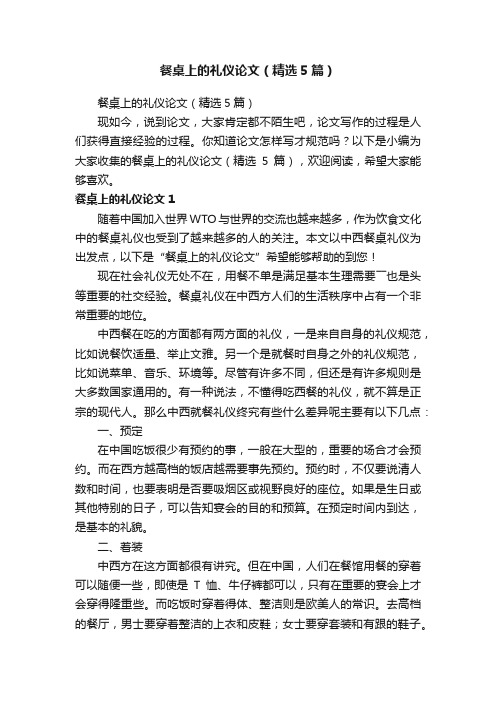
餐桌上的礼仪论文(精选5篇)餐桌上的礼仪论文(精选5篇)现如今,说到论文,大家肯定都不陌生吧,论文写作的过程是人们获得直接经验的过程。
你知道论文怎样写才规范吗?以下是小编为大家收集的餐桌上的礼仪论文(精选5篇),欢迎阅读,希望大家能够喜欢。
餐桌上的礼仪论文1随着中国加入世界WTO与世界的交流也越来越多,作为饮食文化中的餐桌礼仪也受到了越来越多的人的关注。
本文以中西餐桌礼仪为出发点,以下是“餐桌上的礼仪论文”希望能够帮助的到您!现在社会礼仪无处不在,用餐不单是满足基本生理需要――也是头等重要的社交经验。
餐桌礼仪在中西方人们的生活秩序中占有一个非常重要的地位。
中西餐在吃的方面都有两方面的礼仪,一是来自自身的礼仪规范,比如说餐饮适量、举止文雅。
另一个是就餐时自身之外的礼仪规范,比如说菜单、音乐、环境等。
尽管有许多不同,但还是有许多规则是大多数国家通用的。
有一种说法,不懂得吃西餐的礼仪,就不算是正宗的现代人。
那么中西就餐礼仪终究有些什么差异呢主要有以下几点:一、预定在中国吃饭很少有预约的事,一般在大型的,重要的场合才会预约。
而在西方越高档的饭店越需要事先预约。
预约时,不仅要说清人数和时间,也要表明是否要吸烟区或视野良好的座位。
如果是生日或其他特别的日子,可以告知宴会的目的和预算。
在预定时间内到达,是基本的礼貌。
二、着装中西方在这方面都很有讲究。
但在中国,人们在餐馆用餐的穿着可以随便一些,即使是T恤、牛仔裤都可以,只有在重要的宴会上才会穿得隆重些。
而吃饭时穿着得体、整洁则是欧美人的常识。
去高档的餐厅,男士要穿着整洁的上衣和皮鞋;女士要穿套装和有跟的鞋子。
如果指定穿正式服装的话,男士必须打领带。
再昂贵的休闲服,也不能随意穿着上餐厅。
此外最重要的是手一定要保持干净,指甲修剪整齐。
进餐过程中,不要解开纽扣或当众脱衣。
三、入座入座时如果有主人或招待人员,那么座位应该听候主人或招待人员指派,不要过于礼让。
如未定座位,应由尊长坐上座,自己捡低档的座位坐下,不必过于谦恭。
中西方商务餐桌礼仪文化分析
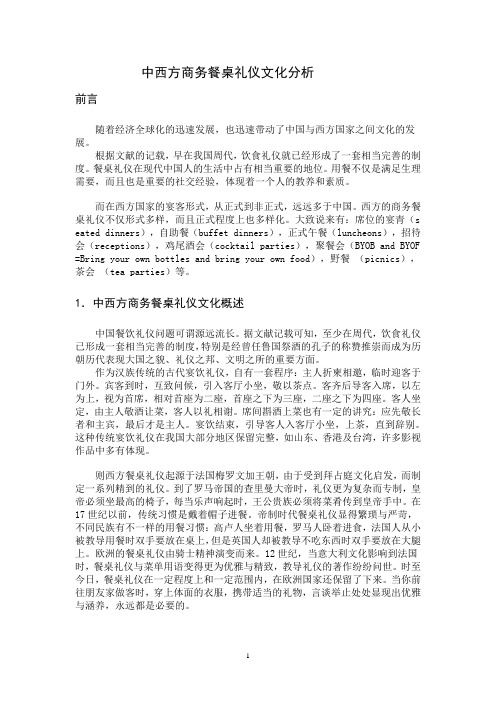
中西方商务餐桌礼仪文化分析前言随着经济全球化的迅速发展,也迅速带动了中国与西方国家之间文化的发展。
根据文献的记载,早在我国周代,饮食礼仪就已经形成了一套相当完善的制度。
餐桌礼仪在现代中国人的生活中占有相当重要的地位。
用餐不仅是满足生理需要,而且也是重要的社交经验,体现着一个人的教养和素质。
而在西方国家的宴客形式,从正式到非正式,远远多于中国。
西方的商务餐桌礼仪不仅形式多样,而且正式程度上也多样化。
大致说来有:席位的宴青(s eated dinners),自助餐(buffet dinners),正式午餐(luncheons),招待会(receptions),鸡尾酒会(cocktail parties),聚餐会(BYOB and BYOF =Bring your own bottles and bring your own food),野餐(picnics),茶会(tea parties)等。
1.中西方商务餐桌礼仪文化概述中国餐饮礼仪问题可谓源远流长。
据文献记载可知,至少在周代,饮食礼仪已形成一套相当完善的制度,特别是经曾任鲁国祭酒的孔子的称赞推崇而成为历朝历代表现大国之貌、礼仪之邦、文明之所的重要方面。
作为汉族传统的古代宴饮礼仪,自有一套程序:主人折柬相邀,临时迎客于门外。
宾客到时,互致问候,引入客厅小坐,敬以茶点。
客齐后导客入席,以左为上,视为首席,相对首座为二座,首座之下为三座,二座之下为四座。
客人坐定,由主人敬酒让菜,客人以礼相谢。
席间斟酒上菜也有一定的讲究:应先敬长者和主宾,最后才是主人。
宴饮结束,引导客人入客厅小坐,上茶,直到辞别。
这种传统宴饮礼仪在我国大部分地区保留完整,如山东、香港及台湾,许多影视作品中多有体现。
则西方餐桌礼仪起源于法国梅罗文加王朝,由于受到拜占庭文化启发,而制定一系列精到的礼仪。
到了罗马帝国的查里曼大帝时,礼仪更为复杂而专制,皇帝必须坐最高的椅子,每当乐声响起时,王公贵族必须将菜肴传到皇帝手中。
浅谈中西方餐桌礼仪的相关文化
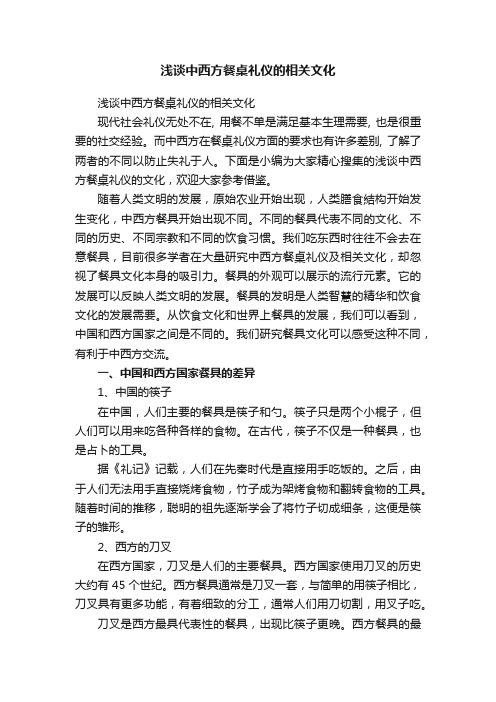
浅谈中西方餐桌礼仪的相关文化浅谈中西方餐桌礼仪的相关文化现代社会礼仪无处不在, 用餐不单是满足基本生理需要, 也是很重要的社交经验。
而中西方在餐桌礼仪方面的要求也有许多差别, 了解了两者的不同以防止失礼于人。
下面是小编为大家精心搜集的浅谈中西方餐桌礼仪的文化,欢迎大家参考借鉴。
随着人类文明的发展,原始农业开始出现,人类膳食結构开始发生变化,中西方餐具开始出现不同。
不同的餐具代表不同的文化、不同的历史、不同宗教和不同的饮食习惯。
我们吃东西时往往不会去在意餐具,目前很多学者在大量研究中西方餐桌礼仪及相关文化,却忽视了餐具文化本身的吸引力。
餐具的外观可以展示的流行元素。
它的发展可以反映人类文明的发展。
餐具的发明是人类智慧的精华和饮食文化的发展需要。
从饮食文化和世界上餐具的发展,我们可以看到,中国和西方国家之间是不同的。
我们研究餐具文化可以感受这种不同,有利于中西方交流。
一、中国和西方国家餐具的差异1、中国的筷子在中国,人们主要的餐具是筷子和勺。
筷子只是两个小棍子,但人们可以用来吃各种各样的食物。
在古代,筷子不仅是一种餐具,也是占卜的工具。
据《礼记》记载,人们在先秦时代是直接用手吃饭的。
之后,由于人们无法用手直接烧烤食物,竹子成为架烤食物和翻转食物的工具。
随着时间的推移,聪明的祖先逐渐学会了将竹子切成细条,这便是筷子的雏形。
2、西方的刀叉在西方国家,刀叉是人们的主要餐具。
西方国家使用刀叉的历史大约有45个世纪。
西方餐具通常是刀叉一套,与简单的用筷子相比,刀叉具有更多功能,有着细致的分工,通常人们用刀切割,用叉子吃。
刀叉是西方最具代表性的餐具,出现比筷子更晚。
西方餐具的最初起源是与欧洲古代游牧民族的生活方式相关的。
为了在残酷恶劣的环境中生存,他们必须学会充分利用锋利的狩猎工具。
生肉通常比较大块,因此切割和饮食的过程十分依赖于锋利的工具。
3、中国餐具筷子的使用在中国,在你吃食物之前,筷子应该放在碗的右边,吃完后需将筷子放在碗的中间。
中西方餐桌礼仪的跨文化研究

中西方餐桌礼仪的跨文化研究餐桌礼仪是人类社会文化的重要组成部分,它反映了不同国家和地区的文化传统和价值观。
中国和西方国家在餐桌礼仪方面存在着显著的差异,这种差异不仅仅体现在餐具使用、食物选择和用餐时间等方面,更深入到文化观念和价值观的层面。
本文将从跨文化的角度,对中西方餐桌礼仪的差异及其影响进行深入探讨。
在中国的餐桌礼仪中,使用筷子和勺子是最常见的餐具,而西方国家则更倾向于使用刀叉。
筷子的使用需要技巧和练习,但它也表达了东方文化中的一种谦逊和尊重。
而在西方国家,刀叉的使用则被视为一种文明的象征。
中西方在食物选择方面也存在显著差异。
中国菜系种类繁多,注重色香味俱佳,而西方国家的食物则多以烤、炸、煮为主,更加强调食材的原味。
中餐的用餐顺序通常为冷盘、热菜、主食、汤品、水果,而西餐的用餐顺序则为开胃菜、主菜、甜点、咖啡或茶。
中西方在用餐时间方面也存在差异。
中国以集体为重,注重聚餐的气氛,因此用餐时间较长。
而西方国家则更注重个人时间,用餐时间相对较短。
在敬酒方面,中西方也有不同的习俗。
中国人在酒席上会多次相互敬酒,并且有祝酒词和干杯的习俗,这体现了中国人的热情和礼貌。
而西方国家则更加注重酒水的品种和配菜,敬酒的次数相对较少。
中西方餐桌礼仪的差异受到多种因素的影响,包括地理环境、历史背景、宗教信仰等。
这些差异在不同的国家和地区表现得尤为突出。
在中国,餐桌礼仪受到孔孟之道的影响,强调尊重长辈、谦虚谨慎。
而在西方国家,受基督教文化的影响,餐桌礼仪更加强调自由、平等和竞争。
然而,随着全球化的推进,中西方餐桌礼仪也在相互借鉴和融合。
西方的餐饮文化已经在中国广泛传播,而中国的传统礼仪也在逐渐被西方人所接受。
这种跨文化的交流与融合为中西方餐桌礼仪的发展带来了新的机遇和挑战。
在中国的团圆饭中,餐具的使用、食物的选择和敬酒的方式都有其特殊的含义。
团圆饭不仅是味觉的享受,更是一次精神的团聚。
家人们通过共享美食,表达对过去一年的感恩和对新一年的期许。
中西方餐桌文化差异论文

中西方饮食文化差异以及餐桌礼仪的对比摘要:中西两家因为深受不同的社会文化、历史文化和各种社会背景的影响,从而导致两种不同文化的产生,餐桌礼仪文化业因此应运而生,餐桌礼仪文化是饮食文化的一部分,中西饮食文化的不同是中西民族文化差异的重要组成部分。
每个国家、每个地区的每种民族都在饮食中自觉不自觉的透露着自己深刻的文化背景。
本文着重论述中西方在餐桌礼仪文化上的差异,剖析中西方餐桌礼仪文化差异的具体表现和渊源。
Chinese and western two because by different social and cultural, historical and cultural and social background of influence, resulting in two different cultures of generation, table manners culture industry so arises at the historic moment, table manners culture is part of the diet culture, Chinese and western diet culture of different cultural differences between Chinese and western nations is an important component. Every country and every area of each nationality they are consciously or unconsciously in food in the revealed himself deep cultural background. This paper elaborates on table manners cultural differences between Chinese and western table manners, analyzes the cultural differences between the concrete manifestation and origins.关键词: 跨文化交际; 饮食文化; 餐桌礼仪; 文化差异进入21世纪以来, 跨文化交际已经成为人们生活中不可或缺的内容。
中西餐桌礼仪差异论文

中西餐桌礼仪差异论文中西餐桌礼仪差异论文随着当今世界全球化步伐的加快,中国与其他国家在政治,经济,文化等方面的联系越来越紧密。
而礼仪无疑在这种联系中发挥着无比重要的作用,而各国由于在历史传统,风俗习惯,宗教信仰等方面,对礼仪都有着各自不同的理解,同时又有着具有民族特色的礼仪传统。
以下是中西餐桌礼仪差异论文,欢迎阅读。
深受中西方社会文化,历史文化及其各种社会因素的影响,使两种文化的距离相差甚远。
在中国,任何一个宴会,不管是什么目的,都会有一种形式。
就是大家团团围坐,共享一席;宴席要用圆桌,这就从形式上造成了一种团结、礼貌共趣的气势。
美味佳肴放在一桌人的中心,它既是一桌人欣赏品尝的对象,又是一桌人感情交流的媒介物。
人与人相互敬酒相互让菜劝菜,再美好的事物面前,体现了人与人之间相互尊重争让的美德。
反映了中国古典哲学中“和”这个范畴对后代思想的影响,便于集体的情感交流,因而至今难以改革而西方这个主要以面食为主的群体,餐桌礼仪的细节就显得更加繁琐而有条不紊。
他们所用的餐则是分餐制,人自扫盘中菜,不管他人碗里汤,互不相扰。
西方人喝酒也听凭自愿,白兰地,威士忌,鸡尾酒,喜欢什么喝什么,想喝多少喝多少,所尊重的是个人意志,体现出的饮食思想观念要合理的多。
综上,中西礼仪千万种,以下是我对餐桌礼仪的一些浅析方法。
一、出席时间的差异中国人是多样化时间观念的人,西方人是单一时间观念的人。
要求做任何事情都要严格遵守日程安排,该干什么就干什么,一般说来,时间多样化模式的中国人更倾向于迟到半小时之后到达,主人似乎也早有思想准备,通常会在这段等待的时间里安排些其他节目,如打牌,喝喝茶,聊聊天等,让一些先到的客人们消磨时间。
对于这种迟到现象主客双方都习以为常,并不将之视为对主人邀请的一种轻视或者不礼貌的行为。
在西方国家各种活动都按预定的时间开始,迟到是很不礼貌的,正式的宴会要求准时到达,十分钟后不到者,将会被视为不合礼仪,是对主人及其他客人的不尊重。
中西方餐桌礼仪的文献综述

Literature ReviewIn the past few years, a lot of studies have been done and published on the reasons of table manners’differences between China and the West. From the past literature reviews, we may see that this field of study has become more and more important and many people, not only scholars, but also some foreign trade clerks, have been involved in the study. Manners in every country are different. What is polite in China may not be polite in other countries.Realizing this point will help us enjoy western food with your foreign friends. My research will focus on this topic and analyze the reasons of the differences.In accordance with the former researchers' studies, there are three reasons that caused the differences. They are cultural background, historical background and customs.Different nations or regions have different culture. In terms of the different cultural background, we will mainly introduce two aspects. They are religious beliefs and values. Most Chinese believe in Buddhism, Confucianism and Taoism. The Buddhist advocates “merciful Purdue beings”and “harmony”. Westerners mostly believe in Catholicism or Christianity, and believe that God created man(Zhang Wenjuan, 2009) and the western culture is self-centered, the boundary between people is clear. And also Zhang Wenjuan pointed out in her paper that “thousand of years of Chinese traditional culture in the Chinese Buddhism makes Chinese table manners modest.” (2009) Different table manners reflect different national heart in different culture, such as, chopsticks in China, knives and forks in West. So the table manner is the reflection of national cultural identification. (Dong Baojun, 2005) Otherwise, different values can cause the difference of table manners. In cross-cultural communication, value is the core of culture. As a result, every country or society has their own value.To some extent, table manners are an epitome of a country’s value. Clyde Kluckhohn thought, value is “a concept of individual or collective possess which is dominant or recessive, it has national characters. The concepts affect people’s choices among the various behavior patterns, methods and goals.”(2005) In China, collectivism is the guiding value. But in western countries, they emphasize on individualism, self-worth and respect. The sharp contrast values also give expression to the table manners. (2005)Just as Chinese often share a plate of food together, while westerners often eat food in their own plate.As to the historical background, China and the West obviously have their different history. In China, the table manners could date back to Zhou Dynasty; table manners have shaped quite complete system. After being highly praised by Confucius, table etiquette became the important part of powerful country. From Qing Dynasty, the modern table manners gradually shaped. (Dong Baojun, 2005) What’s more, the western etiquette also has a long history. The western table manners originated from Merovingian Dynasty in France. It is developed from the spirit of knight during the 11th century to 12th century; banquet became the center of western feudalism. In 13th century, it gradually had access to family and friendship. (Margaret Visser, 2007) With respect to the custom, the eating process usually consists of three parts. They are before dinner, in the dinner, after dinner. There are some etiquettes which should be observed during the whole process. Before dinner, we need to notice the arrival time, seating arrangement, order dishes and so on. In the dinner, we also needto know usage of napkin, usage of tableware, special tips and some drinking etiquette. After dinner, Chinese and westerners also have different ways of paying the bill. The westerners usually give tip to server. The usual amount to tip is between 15% and 20% of the total amount of the bill. (Hao Han, 2007) But Chinese usually don’t give tip to server.Based on all the above discussion, I have chosen “an analysis on the reason of table manners’ differences between China and the West” for my research, and as the topic of my thesis. And it is believed that, from what has been discussed, it is still developing on the etiquette. Learning and using the right etiquette will not only step up our impression, but also promote the communication between people who come from different countries and have different cultural background.Bibliography[1] Post Elizabeth.西方礼仪集萃[M].齐宗华译.北京三联出版社,1991.[2]Margaret Visser.餐桌礼仪:文明举止的起源,发展和含义[M].刘晓媛译,北京新星出版,2007.[3] 董保军.中外礼仪大全[M].民族出版社,2005.[4] 段洁.餐桌礼仪与口才[M].中国经济出版社,2007.[5] 杜学增.中英文化习俗比较[M].外语教学与研究出版社,1998.[6]浩瀚.礼仪英语情景会话模板[M].国防工业出版社,2007.[7] 林莹,毛永年.西餐礼仪[M].中央编译出版社,2009.[8]曲蒙.国际礼仪指南[M].文汇出版社,2006.[9]孙美玲.餐饮礼仪[M].陕西旅游出版社,珠海出版社,2009.[10] 王琪.现代礼仪大全[M].地震出版社,2005.[11] 张文娟.现代商业:中西方餐桌礼仪存在的差异[J].现代商业杂志出版社,2007.。
东西方的餐桌礼仪差异论文
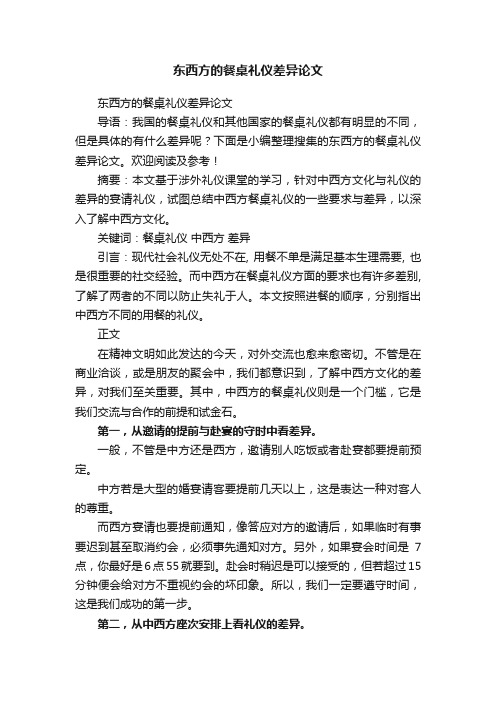
东西方的餐桌礼仪差异论文东西方的餐桌礼仪差异论文导语:我国的餐桌礼仪和其他国家的餐桌礼仪都有明显的不同,但是具体的有什么差异呢?下面是小编整理搜集的东西方的餐桌礼仪差异论文。
欢迎阅读及参考!摘要:本文基于涉外礼仪课堂的学习,针对中西方文化与礼仪的差异的宴请礼仪,试图总结中西方餐桌礼仪的一些要求与差异,以深入了解中西方文化。
关键词:餐桌礼仪中西方差异引言:现代社会礼仪无处不在, 用餐不单是满足基本生理需要, 也是很重要的社交经验。
而中西方在餐桌礼仪方面的要求也有许多差别, 了解了两者的不同以防止失礼于人。
本文按照进餐的顺序,分别指出中西方不同的用餐的礼仪。
正文在精神文明如此发达的今天,对外交流也愈来愈密切。
不管是在商业洽谈,或是朋友的聚会中,我们都意识到,了解中西方文化的差异,对我们至关重要。
其中,中西方的餐桌礼仪则是一个门槛,它是我们交流与合作的前提和试金石。
第一,从邀请的提前与赴宴的守时中看差异。
一般,不管是中方还是西方,邀请别人吃饭或者赴宴都要提前预定。
中方若是大型的婚宴请客要提前几天以上,这是表达一种对客人的尊重。
而西方宴请也要提前通知,像答应对方的邀请后,如果临时有事要迟到甚至取消约会,必须事先通知对方。
另外,如果宴会时间是7点,你最好是6点55就要到。
赴会时稍迟是可以接受的,但若超过15分钟便会给对方不重视约会的坏印象。
所以,我们一定要遵守时间,这是我们成功的第一步。
第二,从中西方座次安排上看礼仪的差异。
古代中国素有“礼仪之邦”之称,讲礼仪,循礼法,崇礼教,重礼信关于中国人的宴席座次礼仪,守礼仪,是中国人数千年的传统。
“不学礼,无以立”,礼的核心是人的社会行为规范,是中国民众已经习惯和风俗化了的社会性行为准则、道德尺度与各种礼节。
我国传统作法是在排列并排的座次时,我国的传统作法是"以左为上",即认为居左之位高于居右之位。
并且先请客人入座上席,在请长者入座客人旁依次入座,入座时要从椅子左边进入。
浅议中西方文化中餐桌文化礼仪的差异毕业论文
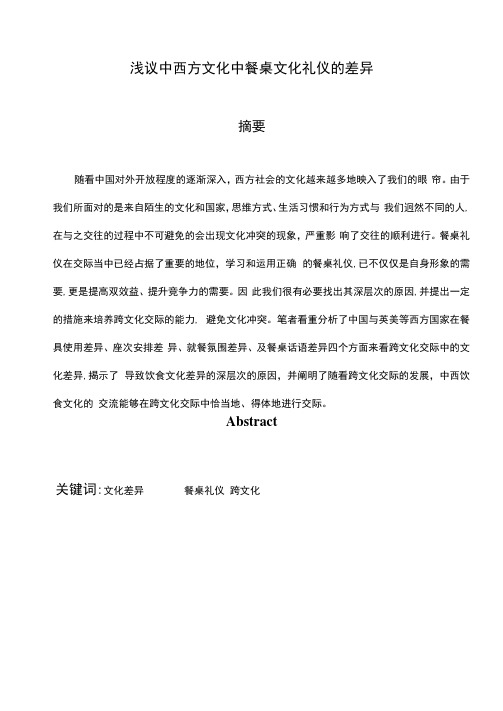
浅议中西方文化中餐桌文化礼仪的差异摘要随看中国对外开放程度的逐渐深入,西方社会的文化越来越多地映入了我们的眼帘。
由于我们所面对的是来自陌生的文化和国家,思维方式、生活习惯和行为方式与我们迥然不同的人,在与之交往的过程中不可避免的会出现文化冲突的现象,严重影响了交往的顺利进行。
餐桌礼仪在交际当中已经占据了重要的地位,学习和运用正确的餐桌礼仪,已不仅仅是自身形象的需要,更是提高双效益、提升竞争力的需要。
因此我们很有必要找出其深层次的原因,并提出一定的措施来培养跨文化交际的能力, 避免文化冲突。
笔者看重分析了中国与英美等西方国家在餐具使用差异、座次安排差异、就餐氛围差异、及餐桌话语差异四个方面来看跨文化交际中的文化差异,揭示了导致饮食文化差异的深层次的原因,并阐明了随看跨文化交际的发展,中西饮食文化的交流能够在跨文化交际中恰当地、得体地进行交际。
Abstract关键词:文化差异餐桌礼仪跨文化With the deA-elopment of Chilians opening-up. more and more Western culture gets into our sight. As we face with unfamiliar cultures and countries, some inevitable cultural conflicts might happen in the communication, which will seriously affect the contacts being carried out smoothly. Table manners have a decisive position in the communication between China and Western countries. During communication we will show our best image and avoid cultural conflicts・ Leaming and using the right etiquette will not only step up our own impression, but also promote the benefit and strife of the company. This paper focuses on the differences of table manners between the West and China, and analyzes the reasons that caused the differences.Tise reveal the cultural differences that led to eating the deep-seated reasons for, and set out along with the development of cross-cultural communication・The exchange of Chinese and Western food culture in cross-cultural communication can be properly and dignified manner communication・Key Words:Cultural Differences Table Manners Intercultural前言 (1)一中方式文化中餐桌文化礼仪及应注意的问题 (2)(一)......................................................... 就座和离席3(二)......................................................... 香巾的使用3(三)................................................. 一般的餐桌文化礼仪3二西方式文化中餐桌文化礼仪及应注意的问题 . (4)(-)订餐准备 (5)(二)............................................................... 祝酒5(三)............................................................... 进餐5(四)........................................................... 餐后礼节6三中西方文化中餐桌文化的差异 . (6)(-)中西文化餐具的差异 (6)(二)......................................... 从座次安排上看中西文化差异6(三)......................................... 从就餐氛围上看中西文化差异7(四)......................................... 从餐桌话语上看中西文化差异7结束语 (8)参考文献 (9)致谢 (10)随着国际交往的不断深入,来自不同国家或文化背景的人们进行的交流不断增多,这种交流被称之为跨文化交际。
论中西方餐桌礼仪的差异 毕业论文

目录摘要 (1)1、中方式文化中餐桌礼仪及应注意的问题 (2)1.1就座和离席 (2)1.2香巾的使用 (2)1.3一般餐桌文化礼仪 (3)2、西方式文化中餐桌文化礼仪及应注意的问题 (3)2.1订餐准备 (4)2.2祝酒 (4)2.3进餐 (4)2.4餐后礼仪 (5)3、中西方文化中餐桌文化的差异 (5)3.1中西文化餐具的差异 (5)3.2从座次安排上看中西文化的差异 (5)3.3从就餐氛围上看中西文化的差异 (5)3.4从餐桌话语上看中西文化的差异 (6)3.5结束语 (6)4、参考文献 (7)5、致谢 (8)论中西方餐桌礼仪的差异摘要:中国的餐桌礼仪文化源远流长。
随着我国对外开方式程度的不断深入,我国与西方文化的交流也变得非常频繁。
由于我们所面对的是来自陌生的国家,在很多的方面都与我国不同,在与之交往的过程中不可避免的会出现文化冲突现象,严重影响了交往的顺利进行。
餐桌礼仪在交际中占据了重要的地位,是我们交流与合作的前提和试金石,【关键字】:中西方文化;餐桌礼仪;差异1、中方式文化中餐桌文化礼仪及应注意的问题餐桌礼仪在中国人的完整生活秩序中占有一个非常重要的地位,他们认为,用餐不单是满足基本生理需要的方法——也是头等重要的社交经验。
为此,掌握某些中式餐饮规则的知识便显得特别重要了,无论你是主人,抑或只是一位客人,都必须掌握一些规则。
在中国圆形餐桌颇受欢迎,不但可以坐更多人,而且大家可以面对面坐,一家之主的身份并不像西方长形餐桌上很清楚地通过他的座位而辨认。
客人应等主人邀请才可坐下,主人必须注意不可让客人坐在靠近上菜的座位,此为一大忌。
必须等到所有人到齐才可以开始任何形式的进餐活动———即使有人迟到也要等。
一旦大家就位,主人家便可以做开场白了。
进餐期间,主人必须承担一个主动积极的角色———敦促客人尽情吃喝是完全合理的。
一张典型中式餐桌看上去相当空,在西方人眼中尤甚。
每张座位前可见放在盘上的一只碗;右面是一组筷子与汤匙,分别放在各自的座上。
中西餐桌礼仪比较论文
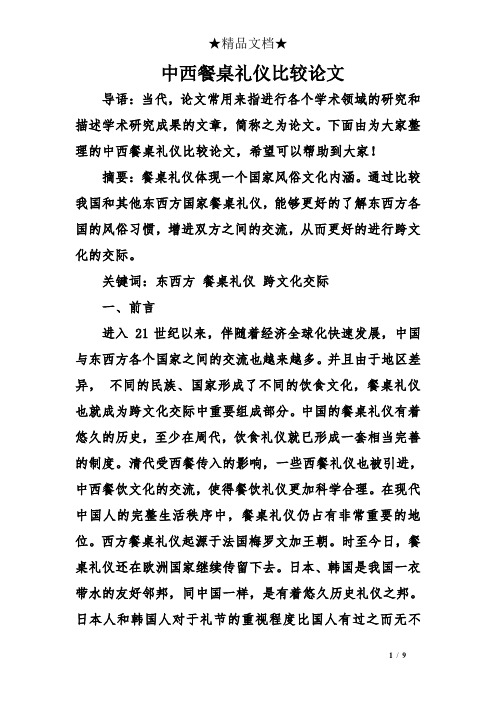
中西餐桌礼仪比较论文导语:当代,论文常用来指进行各个学术领域的研究和描述学术研究成果的文章,简称之为论文。
下面由为大家整理的中西餐桌礼仪比较论文,希望可以帮助到大家!摘要:餐桌礼仪体现一个国家风俗文化内涵。
通过比较我国和其他东西方国家餐桌礼仪,能够更好的了解东西方各国的风俗习惯,增进双方之间的交流,从而更好的进行跨文化的交际。
关键词:东西方餐桌礼仪跨文化交际一、前言进入 21世纪以来,伴随着经济全球化快速发展,中国与东西方各个国家之间的交流也越来越多。
并且由于地区差异,不同的民族、国家形成了不同的饮食文化,餐桌礼仪也就成为跨文化交际中重要组成部分。
中国的餐桌礼仪有着悠久的历史,至少在周代,饮食礼仪就已形成一套相当完善的制度。
清代受西餐传入的影响,一些西餐礼仪也被引进,中西餐饮文化的交流,使得餐饮礼仪更加科学合理。
在现代中国人的完整生活秩序中,餐桌礼仪仍占有非常重要的地位。
西方餐桌礼仪起源于法国梅罗文加王朝。
时至今日,餐桌礼仪还在欧洲国家继续传留下去。
日本、韩国是我国一衣带水的友好邻邦,同中国一样,是有着悠久历史礼仪之邦。
日本人和韩国人对于礼节的重视程度比国人有过之而无不及。
本文将从座次安排、餐具使用、就餐氛围等方面对东西方各国餐桌礼仪进行比较,以便在跨文化交际中能恰当地、得体地进行交际,从而避免因为不恰当的方式或行为造成误解和交际障碍。
二、东西方各国餐桌礼仪差异1.席位安排礼仪(1)中餐餐桌礼仪。
中国餐桌座位的设置十分讲究。
《礼记》中讲“天地位焉”,意为天地万物各有其位,不容紊乱。
在我国,宴会中座位通常是以面向南为上,以面向北为下,形成了“南尊”、“北卑”的传统观念。
传统做法除以南北为尊卑外,在民间吃饭,首座可以是主人就坐,但当有前辈、领导、师长等或年龄比主人高或认为是重要客人的时候,首座必须请最长者、最重要的客人就坐,主人可以陪伴在最重要的客人左右。
然后是左为上,右次之,再后的排列顺序是左右,以次类推,逐个排列下去,最后一个是背对门的座位,也可以是主人或者买单的人坐,这样买单时进出就不会影响其他的客人。
中西餐礼仪文化差异论文
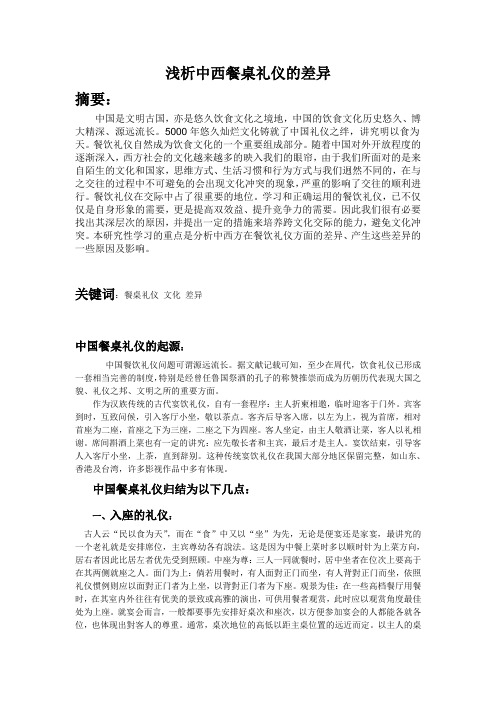
浅析中西餐桌礼仪的差异摘要:中国是文明古国,亦是悠久饮食文化之境地,中国的饮食文化历史悠久、博大精深、源远流长。
5000年悠久灿烂文化铸就了中国礼仪之绊,讲究明以食为天。
餐饮礼仪自然成为饮食文化的一个重要组成部分。
随着中国对外开放程度的逐渐深入,西方社会的文化越来越多的映入我们的眼帘,由于我们所面对的是来自陌生的文化和国家,思维方式、生活习惯和行为方式与我们迥然不同的,在与之交往的过程中不可避免的会出现文化冲突的现象,严重的影响了交往的顺利进行。
餐饮礼仪在交际中占了很重要的地位。
学习和正确运用的餐饮礼仪,已不仅仅是自身形象的需要,更是提高双效益、提升竞争力的需要。
因此我们很有必要找出其深层次的原因,并提出一定的措施来培养跨文化交际的能力,避免文化冲突。
本研究性学习的重点是分析中西方在餐饮礼仪方面的差异、产生这些差异的一些原因及影响。
关键词:餐桌礼仪文化差异中国餐桌礼仪的起源:中国餐饮礼仪问题可谓源远流长。
据文献记载可知,至少在周代,饮食礼仪已形成一套相当完善的制度,特别是经曾任鲁国祭酒的孔子的称赞推崇而成为历朝历代表现大国之貌、礼仪之邦、文明之所的重要方面。
作为汉族传统的古代宴饮礼仪,自有一套程序:主人折柬相邀,临时迎客于门外。
宾客到时,互致问候,引入客厅小坐,敬以茶点。
客齐后导客入席,以左为上,视为首席,相对首座为二座,首座之下为三座,二座之下为四座。
客人坐定,由主人敬酒让菜,客人以礼相谢。
席间斟酒上菜也有一定的讲究:应先敬长者和主宾,最后才是主人。
宴饮结束,引导客人入客厅小坐,上茶,直到辞别。
这种传统宴饮礼仪在我国大部分地区保留完整,如山东、香港及台湾,许多影视作品中多有体现。
中国餐桌礼仪归结为以下几点:一、入座的礼仪:古人云“民以食为天”,而在“食”中又以“坐”为先,无论是便宴还是家宴,最讲究的一个老礼就是安排席位,主宾尊幼各有說法。
这是因为中餐上菜时多以顺时针为上菜方向,居右者因此比居左者优先受到照顾。
中美饮食文化差异参考文献
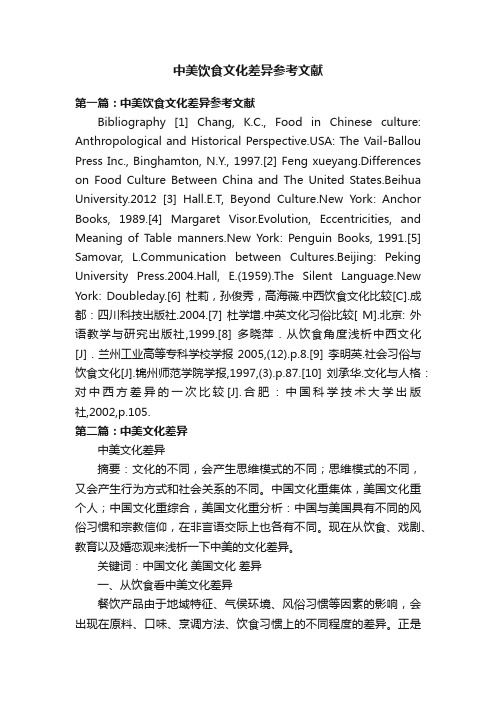
中美饮食文化差异参考文献第一篇:中美饮食文化差异参考文献Bibliography [1] Chang, K.C., Food in Chinese culture: Anthropological and Historical A: The Vail-Ballou Press Inc., Binghamton, N.Y., 1997.[2] Feng xueyang.Differences on Food Culture Between China and The United States.Beihua University.2012 [3] Hall.E.T, Beyond Culture.New York: Anchor Books, 1989.[4] Margaret Visor.Evolution, Eccentricities, and Meaning of Table manners.New York: Penguin Books, 1991.[5] Samovar, munication between Cultures.Beijing: Peking University Press.2004.Hall, E.(1959).The Silent Language.New York: Doubleday.[6] 杜莉,孙俊秀,高海薇.中西饮食文化比较[C].成都:四川科技出版社.2004.[7] 杜学增.中英文化习俗比较[ M].北京: 外语教学与研究出版社,1999.[8] 多晓萍.从饮食角度浅析中西文化[J].兰州工业高等专科学校学报2005,(12).p.8.[9] 李明英.社会习俗与饮食文化[J].锦州师范学院学报,1997,(3).p.87.[10] 刘承华.文化与人格:对中西方差异的一次比较[J].合肥:中国科学技术大学出版社,2002,p.105.第二篇:中美文化差异中美文化差异摘要:文化的不同,会产生思维模式的不同;思维模式的不同,又会产生行为方式和社会关系的不同。
浅谈中西方餐桌礼仪的文化
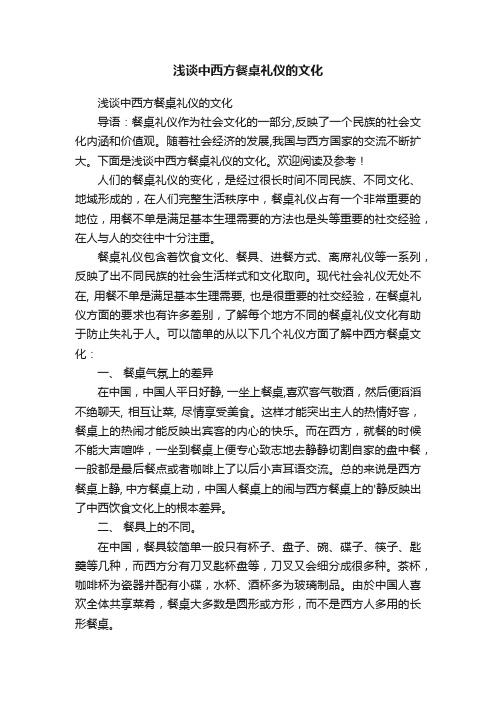
浅谈中西方餐桌礼仪的文化浅谈中西方餐桌礼仪的文化导语:餐桌礼仪作为社会文化的一部分,反映了一个民族的社会文化内涵和价值观。
随着社会经济的发展,我国与西方国家的交流不断扩大。
下面是浅谈中西方餐桌礼仪的文化。
欢迎阅读及参考!人们的餐桌礼仪的变化,是经过很长时间不同民族、不同文化、地域形成的,在人们完整生活秩序中,餐桌礼仪占有一个非常重要的地位,用餐不单是满足基本生理需要的方法也是头等重要的社交经验,在人与人的交往中十分注重。
餐桌礼仪包含着饮食文化、餐具、进餐方式、离席礼仪等一系列,反映了出不同民族的社会生活样式和文化取向。
现代社会礼仪无处不在, 用餐不单是满足基本生理需要, 也是很重要的社交经验,在餐桌礼仪方面的要求也有许多差别,了解每个地方不同的餐桌礼仪文化有助于防止失礼于人。
可以简单的从以下几个礼仪方面了解中西方餐桌文化:一、餐桌气氛上的差异在中国,中国人平日好静, 一坐上餐桌,喜欢客气敬酒,然后便滔滔不绝聊天, 相互让菜, 尽情享受美食。
这样才能突出主人的热情好客,餐桌上的热闹才能反映出宾客的内心的快乐。
而在西方,就餐的时候不能大声喧哗,一坐到餐桌上便专心致志地去静静切割自家的盘中餐,一般都是最后餐点或者咖啡上了以后小声耳语交流。
总的来说是西方餐桌上静, 中方餐桌上动,中国人餐桌上的闹与西方餐桌上的'静反映出了中西饮食文化上的根本差异。
二、餐具上的不同。
在中国,餐具较简单一般只有杯子、盘子、碗、碟子、筷子、匙羹等几种,而西方分有刀叉匙杯盘等,刀叉又会细分成很多种。
茶杯,咖啡杯为瓷器并配有小碟,水杯、酒杯多为玻璃制品。
由於中国人喜欢全体共享菜肴,餐桌大多数是圆形或方形,而不是西方人多用的长形餐桌。
三、进餐礼仪的不同在中国,宾客入席后,不要立即动手取食。
而应待主人打招呼,由主人举杯示意开始时,客人才能开始;客人不能抢在主人前面。
吃的菜品会很丰富,而且要符合宾客要求。
宾客夹菜要文明,应等菜肴转到自已面前时,再动筷子,不要抢在邻座前面,一次夹菜也不宜过多。
- 1、下载文档前请自行甄别文档内容的完整性,平台不提供额外的编辑、内容补充、找答案等附加服务。
- 2、"仅部分预览"的文档,不可在线预览部分如存在完整性等问题,可反馈申请退款(可完整预览的文档不适用该条件!)。
- 3、如文档侵犯您的权益,请联系客服反馈,我们会尽快为您处理(人工客服工作时间:9:00-18:30)。
Literature ReviewIn the past few years, a lot of studies have been done and published on the reasons of table manners’differences between China and the West. From the past literature reviews, we may see that this field of study has become more and more important and many people, not only scholars, but also some foreign trade clerks, have been involved in the study. Manners in every country are different. What is polite in China may not be polite in other countries.Realizing this point will help us enjoy western food with your foreign friends. My research will focus on this topic and analyze the reasons of the differences.In accordance with the former researchers' studies, there are three reasons that caused the differences. They are cultural background, historical background and customs.Different nations or regions have different culture. In terms of the different cultural background, we will mainly introduce two aspects. They are religious beliefs and values. Most Chinese believe in Buddhism, Confucianism and Taoism. The Buddhist advocates “merciful Purdue beings”and “harmony”. Westerners mostly believe in Catholicism or Christianity, and believe that God created man(Zhang Wenjuan, 2009) and the western culture is self-centered, the boundary between people is clear. And also Zhang Wenjuan pointed out in her paper that “thousand of years of Chinese traditional culture in the Chinese Buddhism makes Chinese table manners modest.” (2009) Different table manners reflect different national heart in different culture, such as, chopsticks in China, knives and forks in West. So the table manner is the reflection of national cultural identification. (Dong Baojun, 2005) Otherwise, different values can cause the difference of table manners. In cross-cultural communication, value is the core of culture. As a result, every country or society has their own value.To some extent, table manners are an epitome of a country’s value. Clyde Kluckhohn thought, value is “a concept of individual or collective possess which is dominant or recessive, it has national characters. The concepts affect people’s choices among the various behavior patterns, methods and goals.”(2005) In China, collectivism is the guiding value. But in western countries, they emphasize on individualism, self-worth and respect. The sharp contrast values also give expression to the table manners. (2005)Just as Chinese often share a plate of food together, while westerners often eat food in their own plate.As to the historical background, China and the West obviously have their different history. In China, the table manners could date back to Zhou Dynasty; table manners have shaped quite complete system. After being highly praised by Confucius, table etiquette became the important part of powerful country. From Qing Dynasty, the modern table manners gradually shaped. (Dong Baojun, 2005) What’s more, the western etiquette also has a long history. The western table manners originated from Merovingian Dynasty in France. It is developed from the spirit of knight during the 11th century to 12th century; banquet became the center of western feudalism. In 13th century, it gradually had access to family and friendship. (Margaret Visser, 2007) With respect to the custom, the eating process usually consists of three parts. They are before dinner, in the dinner, after dinner. There are some etiquettes which should be observed during the whole process. Before dinner, we need to notice the arrival time, seating arrangement, order dishes and so on. In the dinner, we also needto know usage of napkin, usage of tableware, special tips and some drinking etiquette. After dinner, Chinese and westerners also have different ways of paying the bill. The westerners usually give tip to server. The usual amount to tip is between 15% and 20% of the total amount of the bill. (Hao Han, 2007) But Chinese usually don’t give tip to server.Based on all the above discussion, I have chosen “an analysis on the reason of table manners’ differences between China and the West” for my research, and as the topic of my thesis. And it is believed that, from what has been discussed, it is still developing on the etiquette. Learning and using the right etiquette will not only step up our impression, but also promote the communication between people who come from different countries and have different cultural background.Bibliography[1] Post Elizabeth.西方礼仪集萃[M].齐宗华译.北京三联出版社,1991.[2]Margaret Visser.餐桌礼仪:文明举止的起源,发展和含义[M].刘晓媛译,北京新星出版,2007.[3] 董保军.中外礼仪大全[M].民族出版社,2005.[4] 段洁.餐桌礼仪与口才[M].中国经济出版社,2007.[5] 杜学增.中英文化习俗比较[M].外语教学与研究出版社,1998.[6]浩瀚.礼仪英语情景会话模板[M].国防工业出版社,2007.[7] 林莹,毛永年.西餐礼仪[M].中央编译出版社,2009.[8]曲蒙.国际礼仪指南[M].文汇出版社,2006.[9]孙美玲.餐饮礼仪[M].陕西旅游出版社,珠海出版社,2009.[10] 王琪.现代礼仪大全[M].地震出版社,2005.[11] 张文娟.现代商业:中西方餐桌礼仪存在的差异[J].现代商业杂志出版社,2007.。
